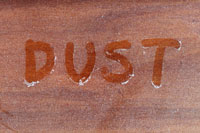What is dust and where does it come from? In Oklahoma, most of us have to deal with pervasive dust in our homes, so it's important to know its source and not only keep it from gaining entrance, but also to control the dust that wafts inside. Controlling dust will vastly improve your indoor air quality.
What Is Dust?
Many online sources claim that dust is us -- that is, most of it is made up of shredded human skin and hair. Turns out, that's untrue. Most human skin and hair particles are washed off during showers and go down the drain. Only a small percentage of the dust in our homes is human-derived.
Most dust blows in from the outdoors, particularly in homes that are less than airtight, or where the doors or windows are kept open, or from tracking the outdoors inside on our feet or on our pets.
The other dust particles are derived from pet hair and dander, decaying insect bodies, carpet fluff and clothing and textile fibers. Some dust may be made of pollen and soot.
Controlling Dust
The best way to keep dust under control is by frequent vacuuming with a HEPA filter. Be sure to vacuum carpets, rugs, furniture and baseboards. But do be aware that vacuuming can scatter dust particles into the air, so whenever possible, clean floors, such as tile or hardwood, with a damp mop.
Your HVAC air filter can play an important role in controlling dust, but to do so effectively, it needs frequent changing. Use a good quality, polyester, pleated air filter so it can catch the smaller particles that the cheap fiberglass filters can't catch. Filters should be rated 8-12 on the MERV (minimum efficiency reporting value) scale.
An in-house air purification system may also help. Consult your HVAC specialist to discuss the best type for your home.
Keep doors and windows shut to keep dust out. Air seal minute cracks around doors and windows that may be allowing dust inside.
For more on preventing dust from compromising your indoor air quality, contact Air Assurance of Broken Arrow.









